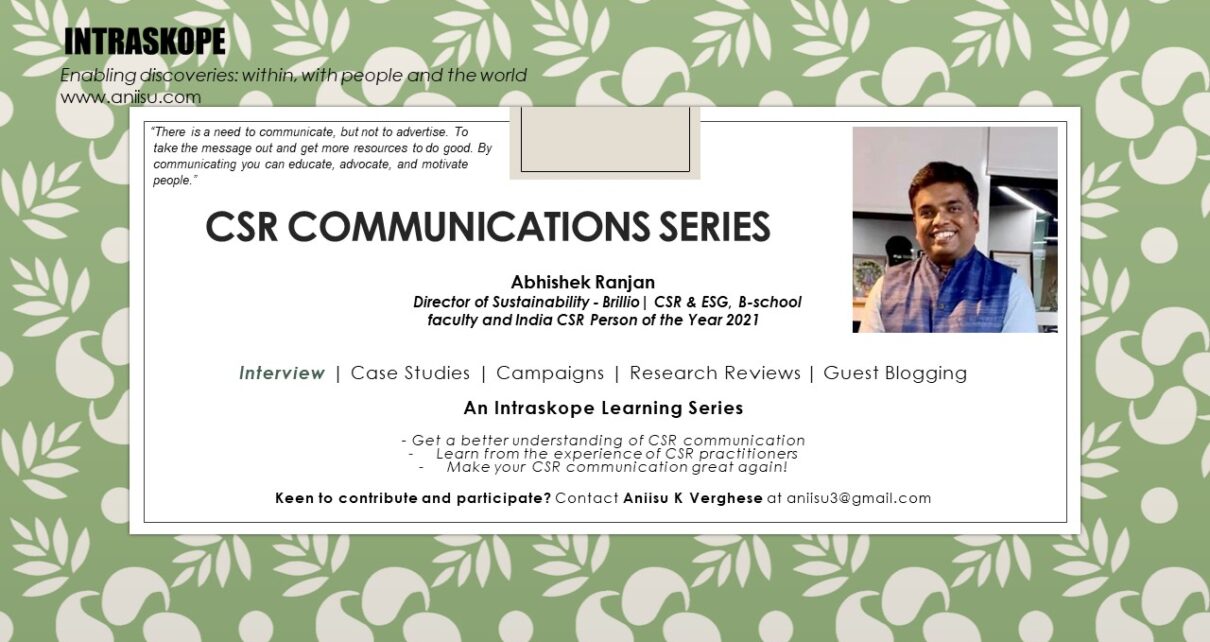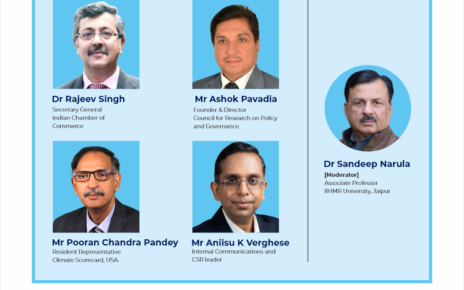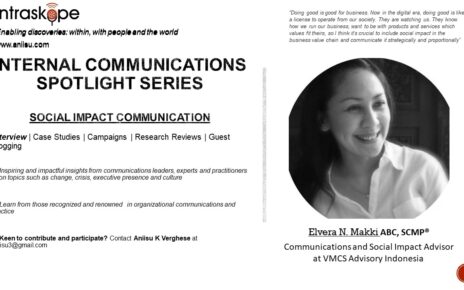Communicating corporate social responsibility is a hands-on responsibility. Not something which can be done from your desk. Investing in communications is important because there are implications for the brand and reputation – for example, people are keen to join organizations that are purpose-led. In the 8th edition of the CSR Communications Series, Abhishek Ranjan of Brillio talks of the value of communicating CSR and how leaders can make a difference.
Abhishek is a thought leader in corporate social responsibility, environmental, social and governance and continually ups the game with creative ways of engaging the communities. He has collaborated and created numerous opportunities for employee volunteering and giving during his career. I have seen how he has partnered with peers and shares best practices. In this interview he talks of the key role of communication in making corporate social responsibility relevant and appealing. Watch the interview now!
This series invites CSR practitioners to share perspectives on the role of communication in showcasing the organization’s citizenship intentions, involving employees in driving social change and making a difference to employee engagement and the world.
Watch the YouTube video interview and read the complete interview below. Look up more such stories on my YouTube channel and on LinkedIn.
Interview
- How is CSR communications understood or defined by your organization? And so why is it so important?
I think sustainability and CSR in today’s world is no longer a ‘feel’ good or ‘do’ good opportunity. It’s all about our teaching the Indian culture through the work we do – that’s a shift. What we have seen in the years is has become a part of the business strategy. That’s why the sustainability and CSR functions are now pretty much a part of how the organization works. From a cultural standpoint, if you communicate, it sounds like we’re boastful, although that is not what it is. It is about presenting your organization’s viewpoint on giving back to the communities.
2. How does your organization communicate CSR? What methods, channels and resources do you use?
I believe that dilemma is to know where to draw a line especially on external communications. There is a need to communicate, but not to advertise. To take the message out and get more resources to do good. By communicating you can educate, advocate, and motivate people.
3. Is there a dedicated team or individual for this role? If yes, what skills do they have and what skills does your organization value most?
We do not have a comms person between the CSR and sustainability. However, when someone joins our team, it is a prerequisite that they have a connection to the environment and society. You have to be a good communicator. Communication is still largely managed by the sustainability team. For external communication (for media) we work with our communications team. Like any marketing, understanding is space is important – to have the skills. The second is that you should be volunteering yourself, to understand how it works and what it takes. To be able to create CSR communications, you need to be involved and have the flair and be sensitive while creating messages. Keep it simple and easy to comprehend and focus on storytelling. It is important to understand the audiences and the influence you have on stakeholders. While the same communication channels exist, newsletter, video, social media – what matters is the skills and passion you bring to the table.
4. Are there budgets allocated to CSR communications and to what kinds of activities does the organization invest most on?
2% CSR doesn’t allow you to invest in marketing and communications. So obviously, your marketing and CSR communication budgets and project costs need to be differently allocated. There is less funding for communicating.
5. What trends do you observe with CSR and related to communicating with internal stakeholders?
My last course just before the pandemic was about NGO marketing, within MBA nonprofit marketing. This course is now in some of the finest B-schools. Most of these schools have sustainability, responsible marketing such as green marketing, There’s a huge surge in terms of social cause-based marketing.
6. Share how CSR communications is practiced at your organization – who leads it, how is it organized and what are the principles you follow?
People are looking at careers in organizations where they bring these dimensions of how, what kinds of social, no messaging and marketing can do. In ESG related marketing, the images are about consumers, where products and packaging becoming an issue for e commerce, in relation to green products,
7. Describe a campaign you are proud of, that resulted in business outcomes or impacted social goals?
For CSR volunteering, seeing is believing, and in the journey of a volunteer in CSR getting inspired is important. We ran a campaign called Previous You. We always talked about people needing help – medical assistance and education support. So, we put the employee at the heart of our communications. “God has been kind to you and it is our turn to give back”, was the message. It is about nudging people to take up change and act. The shift in messaging led to one of the most successful campaigns we ran where 90% of employees participated.
8. What advice do you have for CSR practitioners to communicate effectively?
For professionals, they do go through trial and error before they get it right with communications. There is no one single recipe for communications in organizations. You keep inventing and culture plays a role in communicating CSR. The biggest challenge is – how do you measure your communication? And that nobody’s going to teach you or nobody’s going to tell you. The best part is that you keep measuring your communication efforts and see what works and what was not working best for yourself. Make the employee the center of communication, There are also communication channels like a flashmob to energize staff in unconventional methods. From laptop stickers to technology solutions, having events is very important. Focusing on 2% CSR, there is more thinking about jobs and careers in sustainability, CSR and ESG.
9. What advice do you have for those aspiring to join this evolving domain?
I started my career 14 to 15 years and we have seen how the ESG sector has evolved in the companies where we have worked. CSR was very close to PR. The whole idea of sustainability, from non-fossil fuel cars to green cars, from adoption of alternative energies to the progress with solar power, we see a shift in thinking. A lot of MBAs are now joining the social sector because organizations understood that we need a diverse people to run these programs. We need MSW but we also need people who are architects for data science. Data plays a large part play. The role is both financially rewarding and gratifying to do good for the company or society. I see a surge in MBA programs which are dedicated to sustainability. There’s a huge career opportunity. I have seen people moving from profit to nonprofit coming back to profit – so the opportunities are immense.
10. How can organizations get better with CSR communications?
Communicate, to motivate but don’t communicate to advertise. Leaders must really walk the walk, talk to talk the talk and demonstrate over and over. It is only then your employees will start believing in it. If you just make an announcement in forums, it will not stick. Leaders need to volunteer whenever they can. Leadership communication needs to be authentic and be part of the game. You cannot be out of the game and convince people to participate.
Liked the interview? Do share your feedback and comments.
Keen to participate in the ongoing series on CSR Communications, Personal Branding or Internal Communications? Drop me a note at aniisu3@gmail.com
CSR Resources you can use:
- Share4Care – NGO-Communicator pro-bono sign-up
- COVID-19 funding and volunteering
- Checklist while conducting CSR volunteering initiatives
- Chat with Aniisu on your CSR communications questions
#ESG #sustainability #CSRcommunications #passion #volunteering #purpose #employeengagement #communications #commitment #compassion #CSRcareers #careers #CSRpractice #CSRleaders



